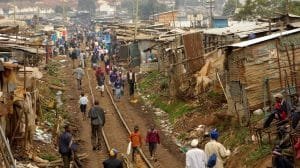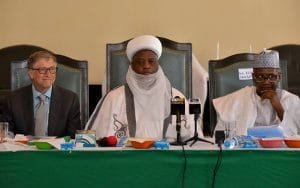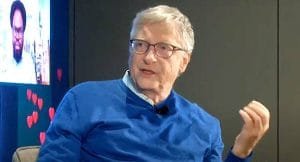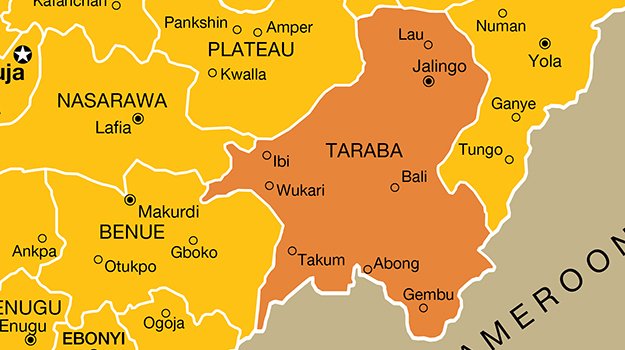Bill Gates’ visit to Nigeria is deliberately strategic to spur the government of President Bola Ahmed Tinubu into fixing the gaps hampering Human Capital Development for the country, Africa Health Report’s Editor, Adesuwa Tsan, writes.
Ever seen a country notorious for breaking its own promises on economic prosperity? Well, welcome to Nigeria where human and natural resources are rich, but human capital development is one of the lowest globally. This is despite the myriads of pledges by successive governments who surprisingly believe the situation may fix itself without fulfilling their own part.
To be clear, Nigeria is on number 152 of countries whose children and young adults are in poverty hole because of a steep decline in human capital development; a key element the country needs to catch up with other developing economies of the world.

But key global leaders understand that, unlike Nigerian leaders, they cannot afford to look away and allow the so called ‘Giant of Africa’ to continue to plunge its citizens into unavoidable suffering occasioned by poor investment in health and education which represent the major drivers for human capital.
One of those leaders who have consistently put pressure on Nigeria to do the right thing whenever a new dispensation assumes power is Mr. Bill Gates, the co-Chair of the Bill and Melinda Gates Foundation (BMGF). Make no mistake. He is not in Nigeria to congratulate President Bola Ahmed Tinubu for his victory at the polls as claimed by the founder, Dangote Group, Mr. Aliko Dangote, in a recent press interview. He is in Nigeria deliberately and strategically to remind the new government of what it must do if it truly want to raise an economically prosperous nation.

The Issues
First, successive governments have paid lip services to health and education. This is reflective in the 2020 Human Capital Index (HCI) which shows that a child born in Nigeria in the 21st century is likely to achieve only 36 per cent of productivity level. This is below the average for sub-Saharan Africa put at 40 per cent. Only six countries have lowered HCI scores globally.
Mr. Gates had in a recent interview said one way out of the mess was for the Nigerian government to increase funding for health and education, noting that the Goal Keeper’s projection suggests that if Nigeria refuses to increase investment in this area, that by 2050, at least 40 per cent of the extremely poor people on earth will come from two nations; Nigeria and the Democratic Republic of Congo.
Polio
Polio eradication is one programme dear to the heart of Mr. Gates. And this is one area he hopes to finally put to rest during President Tinubu’s time in government; especially as new cases are starting to emerge.
On August 25, 2020, Nigeria was declared polio-free by the World Health Organisation (WHO). A lot of work went into achieving that status and BMGF was at the forefront of it. In September 2011, Bill Gates landed in Nigeria to observe the efforts of vaccination teams during a nationwide immunisation exercise. The Northern part of the country was lagging behind in polio immunisation, so he met with government officials, and traditional and religious leaders, mothers, traditional birth attendants, and representatives of a Muslim women’s association in the North to discuss the eradication of polio with them.

The talks in which Mr. Dangote facilitated, led to more acceptance of the polio vaccine in the North and the eventual eradication in 2020. The Gates Foundation also signed a $25 million agreement with the World Bank to support the purchase of more than 100 million doses of oral polio vaccine (OPV) in Nigeria.
Recently, Mr. Gates had said the comeback of polio was a concern, and that all Nigerians, including the government must work to ensure it is totally free from the scourge. This will be one of his key focus during discussion with the present Nigerian government.
His foundation is a familiar name when it comes to health and development in Nigeria and in Africa. Gates’ contribution to meeting health goals of successive governments in Nigeria is significant in terms of funding and capacity building of health workers. His foundation also contributes to the development of agriculture in order to reduce hunger and poverty in Nigeria.
Visit to Tinubu
Although not much was disclosed from the meeting between the two of them, the spokesperson of the president, Mr. Dele Alake, said Tinubu assured Gates, who is a renowned private investor in the global healthcare system, of the readiness of his government to partner with him on his projects in Nigeria, with emphasis on polio and malaria interventions.
However, the visit of the Microsoft founder could be more significant than what the spokesman disclosed. Last week, the president announced the appointment of Dr. Salma Anas as his special adviser on health, a decision which has been applauded by stakeholders in the sector. Her appointment also conveyed a message to international health development organisations that the new government was giving healthcare development a priority status.

The announcement was followed by Mr Gates’ visit to Nigeria as part of the Foundation’s commitment “to work closely with communities and leaders to support innovation that can help accelerate progress and improve lives across Africa.”
According to a statement announcing his visit: “Gates and other foundation leaders are visiting to learn from partners helping to address polio, anaemia, and other health threats; scientists applying research to develop agricultural innovations that will help with food security and climate adaptation; innovators using technology to improve access to financial services; and others working to improve lives in Niger and Nigeria and throughout the continent.
“They will also meet with national and regional leaders to encourage them to make investments and advance policies that promote innovation and provide equitable opportunity, despite challenging economic conditions.”
Due to the financial and technical weight that the BMGF and other affiliated partners pull in providing technical support for Nigeria’s health policies and goals, the Nigerian government often promise to adopt recommendations they make, including on policies, implementation, among others, but makes volte-face when they get what ever they want from these development partners, including the BMGF.
The foundation has spent over $1 billion in the Nigerian health sector so far, Bill Gates announced during a visit to Nigeria in 2018. Will President Tinubu project change in this direction?
The visit by Mr. Gates is expected to usher in new healthcare and development policies, programmes and ideas by the Nigerian government.

Speaking in Lagos on Wednesday, he expressed willingness to provide support, via his foundation, for deployment of Artificial Intelligence (AI) in the health sector to tackle infectious diseases, improve maternal health, food nutrition and women’s empowerment.



